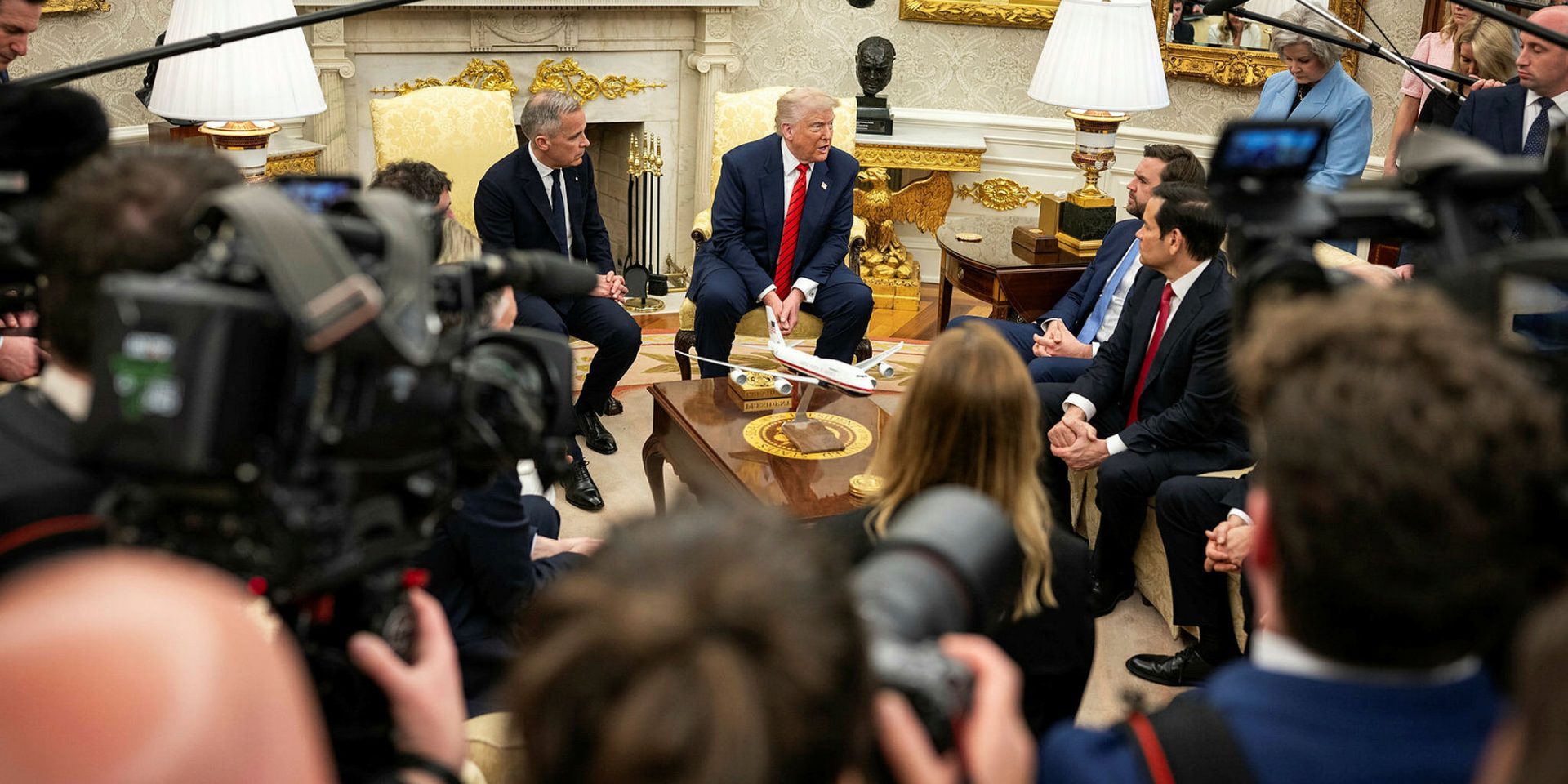Lobbyists address Canada-U.S. dynamic in face of shifting tariffs from unpredictable Trump: ‘it’s changed’

Struggling to anticipate the actions of an American president who repeatedly changes his mind about tariffs has become a concern for lobbyists who are focusing more heavily in recent months on issues pertaining to Canada-United States relations and the economy.
“We’ve learned how many times President [Donald] Trump changes his mind—things get changed, it gets whipped around, even within 24 hours,” said Corinne Pohlmann, executive vice-president of advocacy of the Canadian Federation of Independent Business (CFIB).
“It’s changed how we deal with … making sure we’re representing our members in the best way possible—so that we’re giving the Canadian government the information they need to potentially make decisions that are important for our membership.”
Since the trade war was launched through tariffs imposed by U.S. President Donald Trump earlier this year, Canadian businesses and organizations have watched as these levies have been subjected to multiple delays and increases. Trump sent a letter to Prime Minister Mark Carney (Nepean, Ont.) on July 10, threatening to hit Canada with 35-per-cent tariffs on Aug. 1. On July 28, Carney said bilateral negotiations had reached an “intense phase.”
On July 31, Trump posted on Truth Social that trade talks between the U.S. and Canada had been hurt by Canada’s decision to recognize a Palestinian state. The post by Trump came hours after Carney announced that Canada would formally acknowledge an independent state of Palestine. Carney announced on July 30 that Canada intends to recognize Palestine as a state in September at the UN General Assembly. Carney said Canada will do so if the Palestinian Authority holds elections in 2026, Hamas releases all Israeli hostages, and the Palestinian State is demilitarized. He said Hamas cannot play any role in the elections.
“Wow! Canada has just announced that it is backing statehood for Palestine. That will make it very hard for us to make a Trade Deal with them,” said Trump in the post.
In a separate post, Trump said he spoke with Mexico’s President Claudia Sheinbaum and had agreed to extend Mexico’s trade deal deadline for a 90-day period because the “complexities of a Deal with Mexico are somewhat different than other Nations because of both the problems, and assets, of the Border.”
Later that day on July 31, Trump signed an executive order increasing tariffs on Canadian goods to 35 per cent effective Aug. 1.
Trump’s executive order referred to “Canada’s lack of co-operation in stemming the flood of fentanyl and other illicit drugs across our northern border” and Canada’s retaliation against the U.S.
Asked by reporters on July 31 if Carney’s announcement on Palestine affected trade talks, Trump said: “I didn’t like what they said, but you know, that’s their opinion. Not a deal-breaker. But we haven’t spoken to Canada today. He’s called and we’ll see.”
The earlier 25-per-cent levy on imports from Canada and Mexico, and a 10-per-cent levy on this country’s oil and energy exports, were originally announced by Trump on Feb. 1, but two days later were put on a 30-day pause. By March 6, Trump announced another one-month exemption to tariffs on goods from Canada and Mexico that are compliant with the Canada-United States-Mexico Agreement (CUSMA). On April 2, Trump announced sweeping tariffs with a 10-per-cent baseline on dozens of countries.
On steel and aluminum imports, Trump threatened a 50-per-cent tariff on those goods on March 12, but hours later opted for a levy of 25 per cent. The U.S. steel and aluminum tariffs were later raised to 50 per cent on June 4.
Trump’s unpredictability has made building a response strategy more challenging, according to Pohlmann. Ongoing trade bilateral tensions are driving up costs and creating uncertainty, particularly for small- and medium-enterprises that rely on cross-border trade, according to the CFIB website.

“It’s tricky, and I would definitely say that the current [U.S.] administration is causing us, as an organization, to be much more focused on Canada-U.S. relations in a way that we rarely ever did,” she said.
“It’s always been important, but it’s never had the importance, I think, that we’ve seen in the last four to six months in regard to, what are the impacts? What does this look like? And obviously, it goes beyond just those that are directly importing or exporting with the United States—it’s those that are also indirectly doing that.”
Pohlmann said that an important part of CFIB’s advocacy during the trade war has been seeking clarity about where money collected from Canada’s counter-tariffs against the U.S. will be directed, and ensuring that small firms are not forgotten.
“I know some large companies have already come forward with requests for help, but we have, through our own data, lots and lots of examples of businesses that are being very directly and indirectly affected because of these tariffs on their businesses, many of whom are now coming to a precipice,” she said.
“I’d say a lot of our work has been focused on trying to get some clarity and certainty from the government and ensuring that anything that is collected is going to be reimbursed back to businesses that are affected.”
Muhammad Ali, vice-president for Crestview Strategy and a former Liberal staffer, told The Hill Times that, since the start of the second Trump administration, advocacy in Canada has shifted with an uptick in government outreach from specifically-affected sectors, and a greater need to focus on the Canada-U.S. dynamic.

“The question always remains: what’s next? What’s Trump going to do next? Because no one can really predict his next action. That’s always an opening discussion item,” said Ali, who is also the vice president of the Government Relations Institute of Canada. “There’s a shift of … how to solve the issues and what we need to do. I think that urgency there as well is also a new shift.”
The White House has also opened the door for advocates in Canada to potentially gain traction on certain issues which were previously more of a struggle, such as defence, according to Ali.
Carney announced on June 25 that Canada and other allies in the North Atlantic Treaty Organization (NATO) had agreed to invest five per cent of annual GDP towards defence by 2035.
“For the last, I want to say, anywhere from 10 to 20 years, defence was never a top priority for governments, and so now it is, and [with] the prime minister announcing the increase in NATO spending, there’s new opportunity of how to make that work in Canada,” said Ali.
“A lot of the changes that the prime minister has introduced, whether it’s on defence spending, whether it’s the Canadian economy … all sort of are a reaction, obviously, to the threat from Trump and the need to do better in Canada.”
Dana O’Born, vice-president of strategy and advocacy for the Council of Canadian Innovators (CCI), told The Hil Times that the looming deadlines related to tariffs has left Canada in a “continued position of chaos.”
“I think the uncertainty, especially with so many of our companies inside CCI doing business in the U.S. … it’s really hard to do business,” she said. “The kind of advocacy that we are really focused on is just doubling down on the things that we have been saying for a long time; build our own tech sector, put together data strategies and [intellectual property] strategies that are going to fortify Canada’s ecosystem.”
During the trade war, there has been a monumental shift in advocacy with a “new spotlight on sovereignty and buy-Canada,” according to O’Born.
“This is something that CCI has been beating the drum on for over 10 years now, and really feel like the spotlight is shining upon our Canadian companies,” she said. “I just think there’s been a real inward glance towards ensuring that our domestic ecosystem and our domestic economy really has been put into focus—to fortify the work that our technologists and our CEOs and our innovators are doing.”
Canada has “significant catching up to do,” compared to some other nations when it comes to creating the regulatory frameworks that help to grow domestic companies and keep wealth at home, she said.
“We’ve just been so focused on inviting foreign multinational companies into this country and saying, ‘Great, you guys build it. Go ahead,’ and all of our companies have been quietly and diligently building their own companies. And now, with this moment, we have focused on Canada to create that structural adjustment, if you will,” she said.
Margot Burnell, president of the Canadian Medical Association, told The Hill Times that her group’s advocacy has changed during the trade war to emphasize the relationship between strong health care and a strong economy.

“You have to have healthy workers to have a healthy economy, is the first point. The other point is that the healthcare sector is part of the economy itself, employing three million people and contributing $200-billion to the GDP each year,” she said.
“If you have lots of jobs and people aren’t well enough to fill those jobs, then that’s equally as bad as having healthy Canadians and no jobs. We need to work on both. We need to tie them together.”
Pascal Chan, vice-president of strategic policy and supply chains for the Canadian Chamber of Commerce, told The Hill Times in an emailed statement on July 29 that the White House’s recent trade moves have brought international commerce “back into the top issue set for everyday Canadians” at a level not seen since CUSMA, or even its predecessor, the North American Free Trade Agreement.
“In a time of global economic uncertainty and disruption, it’s more important than ever for business and government to align on a clear path forward. Members of Parliament of all parties have been seized with these issues and are responding to how Canadians are similarly dialed in,” said Chan in the email.
Boston Consulting Group’s Michael McAdoo, a partner who co-leads the firm’s worldwide trade practice, told The Hill Times that he thinks companies shouldn’t limit their policy-shaping efforts to Ottawa, but should consider “what they can do on the U.S. side, as well.”
“I think for companies, it’s just very important to continue to get the message out of the impacts on them, and also for them not to forget that, to the extent that they’ve got interests and customers and suppliers on the U.S. side of the border, to make sure that those voices are being heard,” he said.
McAdoo said that, from a relative standpoint, Canada “still looks pretty good,” compared to most other nations trading with the U.S. because of the “CUSMA privilege.”
“Yes, if you end up in a new trading arrangement, you may well perceive yourself to be absolutely worse off than you were before under the previous arrangement, [but] what really matters is the relative position of different countries, and from that perspective, I remind people that the only two places on planet earth from which you can ship a product to the United States market and not pay a tariff are Canada and Mexico,” he said.
“We could end up in a stronghold North America situation where perhaps Canada has some additional tariffs than it had before … but on a relative basis, if Canada remains advantaged versus other advanced economies such as Japan and the European Union and the U.K., then that’s relatively a good thing for Canada.”
McAdoo estimated that “north of 90 per cent” of Canadian exports by dollar value are exported to the U.S. claiming CUSMA privileges.
“Of course, I’m speaking in broad averages. If you happen to be in the steel and aluminum sector, or potentially parts of the automotive sector, that’s a different story,” he said.
jcnockaert@hilltimes.com
The Hill Times






 LICENSING
LICENSING PODCAST
PODCAST ALERTS
ALERTS













